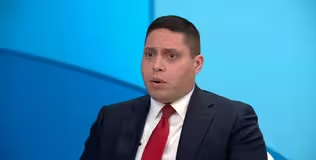
GOP Sen. Johnson says he supports tariffs but has concerns
Clip: 4/3/2025 | 7m 59sVideo has Closed Captions
GOP Sen. Johnson says Wisconsin bracing to see 'how painful' tariff fallout will be
Financial markets sank in the wake of President Trump's decision to impose tariffs on practically all goods being imported to the U.S. Republican Sen. Ron Johnson is a member of the Senate budget and finance committees. His state of Wisconsin exports more than $27 billion in goods to international markets and he joined Amna Nawaz to discuss the tariffs.
Problems playing video? | Closed Captioning Feedback
Problems playing video? | Closed Captioning Feedback
Major corporate funding for the PBS News Hour is provided by BDO, BNSF, Consumer Cellular, American Cruise Lines, and Raymond James. Funding for the PBS NewsHour Weekend is provided by...

GOP Sen. Johnson says he supports tariffs but has concerns
Clip: 4/3/2025 | 7m 59sVideo has Closed Captions
Financial markets sank in the wake of President Trump's decision to impose tariffs on practically all goods being imported to the U.S. Republican Sen. Ron Johnson is a member of the Senate budget and finance committees. His state of Wisconsin exports more than $27 billion in goods to international markets and he joined Amna Nawaz to discuss the tariffs.
Problems playing video? | Closed Captioning Feedback
How to Watch PBS News Hour
PBS News Hour is available to stream on pbs.org and the free PBS App, available on iPhone, Apple TV, Android TV, Android smartphones, Amazon Fire TV, Amazon Fire Tablet, Roku, Samsung Smart TV, and Vizio.
Providing Support for PBS.org
Learn Moreabout PBS online sponsorshipAMNA NAWAZ: Senator Ron Johnson is a member of the Senate Budget and Finance committees.
He's a Republican from the state of Wisconsin, which exports more than $27 billion in goods to international markets.
And I spoke with him earlier today.
Senator Johnson, welcome back to the "News Hour."
Thanks for joining us.
SEN. RON JOHNSON (R-WI): Hope you're doing well.
AMNA NAWAZ: So, as you have probably seen right now, we're speaking as the markets have closed.
They all closed between 4 and 5 percent down.
I know you have called tariffs a double-edged sword before, and you said this morning you have some concerns about these latest tariffs.
Are you more or less concerned seeing what you have seen over this last day now when it comes to these tariffs?
SEN. RON JOHNSON: Well, obviously a 5 percent decrease in the markets would heighten my concern.
I would assume that got the president and his advisers' attention as well.
But at the same time, it's interesting as I talk to manufacturers and farmers in Wisconsin that they agree with what President Trump is trying to accomplish here.
They realize that we have not been treated fairly by our trading partners.
They realize that there are many crucial and vital products that are vital to our national security that we don't manufacture here, and in some way, shape, or form, we're going to have to reshore them.
So they agree with what President Trump's trying to accomplish, but I think everybody's kind of bracing to see what the fallout and really how painful this experience is going to be.
AMNA NAWAZ: Well, I guess we have seen the fallout in these first 24 hours now.
How long do you expect you will allow to pass or your constituents in Wisconsin will allow to pass before you feel like you get a sense if this is working or not?
Is it a matter of weeks or a quarter?
SEN. RON JOHNSON: That's a hypothetical I can't really speak to.
The president's already pointing to some success in terms of the number of -- the trillions of dollars of investment being committed.
Some countries are lowering, if not eliminating, their tariffs.
So again, it is a double-edged sword.
There's going to be benefit, there's going to be cost.
I just can't predict it.
All I can really do is monitor it, make sure that the -- Howard Lutnick, the Commerce Department, the president's well aware of the collateral damage here.
AMNA NAWAZ: What about inflation concerns?
I mean, there are some estimates now that some of this price increase that we might see from the tariffs will start to feed into inflation data within about six weeks or so.
If you see inflation start to tick up, would that worry you more?
SEN. RON JOHNSON: I think the president's well aware that one of the main reasons he was elected, in addition to the open border policy of Biden, was the fact that inflation reached a 40-year high and people weren't happy about that.
So, again, he's got very smart economic advisers.
This is a long-held belief on his part that we have to impose discipline on our trading partners.
And my guess is, he's going to have to judge at what point he's going to have to change course, if at all.
AMNA NAWAZ: I want to know more about your perspective too, because I'm curious if any of those major manufacturers in Wisconsin that you have headquartered there, like Kohler and Harley-Davidson and others -- manufacturing is such a driver of the Wisconsin economy.
Are there any concerns there about the impact and what they will have to face in terms of this short-term pain that the president's mentioned?
SEN. RON JOHNSON: Yes, there are all kinds of concerns.
And, again, I view myself as a free but fair trader.
And, again, we haven't been treated fairly.
Exactly how do you address that problem?
That's the $64,000 question here.
But, no, I'm monitoring the situation.
We're meeting with people and I will be providing that input to the administration.
AMNA NAWAZ: So can you tell us more about what those manufacturer leaders are telling you?
I mean, I know you said you will monitor it, but they have to have some sort of calculation or sense of how long they're willing to bear, how much pain they can bear moving forward.
SEN. RON JOHNSON: Well, each business is different.
To what extent are the importing components?
What is their exposure in terms of export markets?
So every situation is completely different.
But there's no doubt about it.
When you slap tariffs on imported goods and people are using imported components to manufacture and then try and export, that's going to make you less competitive overseas.
It'll drive up costs.
Listen, when prices rise, demand falls.
That could dampen our economy as well.
So, again, this is a bold but risky action the president has taken.
I for one hope he is correct.
I want him to succeed.
I want the American consumers to succeed.
I want Wisconsin manufacturers and farmers to succeed.
AMNA NAWAZ: What about the other tariffs?
We know Canada and Mexico didn't face any additional tariffs in yesterday's announcement, that there were existing tariffs on Canada and Mexico.
And Canada's been your state's top trading partner.
Wisconsin exports some $8 billion in goods.
You import over $6 billion.
And we saw the Canadian prime minister vow to retaliate to those U.S. tariffs.
What kind of impact could that have on Wisconsin?
SEN. RON JOHNSON: You know, the same impact that just putting the tariffs on to begin with was.
So any kind of retaliation will increase the pain level.
There's no doubt about that.
AMNA NAWAZ: And when you say the pain level, who's going to feel that?
I mean, what industries and sectors are you most worried about in your home state?
SEN. RON JOHNSON: Well, again, manufacturers that export, manufacturers that import products that aren't, for example, made in America anymore, it's going to take a long time to onshore some of those products.
So we will certainly be talking to the president as this thing continues to drag out in terms of exemptions to make sure that businesses can survive.
AMNA NAWAZ: And if there aren't exemptions, I mean, in these conversations, if you can give us some insight, for the companies that are going to have to bear some short-term pain, would you suggest that the government come up with some kind of subsidies or something to help mitigate some of that in the short term?
SEN. RON JOHNSON: Subsidies are very difficult to design to really allocate fairly.
I know President Trump, there will be revenue brought in.
He certainly allocated that amongst farmers in the first round of increasing tariffs in his first administration.
So my guess is that might be one of the solutions they might have for some of the dislocations and some of the pain.
AMNA NAWAZ: So, just to be clear about this, your message right now to the leaders of manufacturing and dairy and others in your state is, there's going to be pain, and you're going to have to navigate it on your own?
SEN. RON JOHNSON: No,my message is to make sure that I'm aware of it, so I can pass it along to the administration so they can make good decisions.
AMNA NAWAZ: And what have your conversations with President Trump been like about this?
SEN. RON JOHNSON: Well, I have been primarily focusing on getting his commitment to commit to a pre-pandemic level of spending, which is a whole 'nother issue.
But from my standpoint, that is the most significant one.
We went from $4.43 -- $4.4 trillion in 2019 to 7.3.
Can't justify that level of spending, can't sustain that level of spending.
So that's been my primary concentration with the time I have had with the president.
AMNA NAWAZ: Have you not spoken with him about your... (CROSSTALK) AMNA NAWAZ: I apologize.
SEN. RON JOHNSON: No, he just unveiled these things last night, I have not spoken to him since.
But we will be in touch with the Commerce Department and him as this thing progresses.
AMNA NAWAZ: And what's going to your message to them in terms of your constituents?
SEN. RON JOHNSON: I will tell them the reality.
I will give them the facts.
AMNA NAWAZ: You did say this morning that Congress has already granted a lot of its congressional authority to the president.
We see him using that now on trade.
We just saw this afternoon also Senators Grassley and Cantwell introduce a bipartisan bill that would require the president to notify lawmakers of any new tariffs within 48 hours.
I just wanted to get your reaction to that bill.
Do you support it?
SEN. RON JOHNSON: Well, again, in general, what I was saying is that prior Congresses have willingly given up an awful lot of their constitutional authority to the executive branch.
We haven't done anything specifically for President Trump.
He's just come into office with all that authority.
Whether we can claw that back, whether we should claw that back, that's open for discussion.
AMNA NAWAZ: Specific to how it would work in this bill, though, is that something you would support?
SEN. RON JOHNSON: I have got to take a look at the bill.
AMNA NAWAZ: That is Wisconsin Republican Senator Ron Johnson joining us tonight.
Senator Johnson, thank you for your time.
We appreciate it.
SEN. RON JOHNSON: Have a good evening.
Conservative lawyer on Trump's use of executive power
Video has Closed Captions
Clip: 4/3/2025 | 8m 25s | Conservative constitutional lawyer weighs in on Trump's aggressive use of executive power (8m 25s)
Markets plunge in wake of Trump's tariffs, trade war fears
Video has Closed Captions
Clip: 4/3/2025 | 11m | Markets plunge in wake of Trump's new tariffs and fears of global trade war (11m)
Taiwan boosting defenses to resist Chinese aggression
Video has Closed Captions
Clip: 4/3/2025 | 11m | How Taiwan is boosting its defenses to resist Chinese aggression (11m)
Trump resumes family detention in immigration crackdown
Video has Closed Captions
Clip: 4/3/2025 | 7m 2s | Trump administration resumes family detention in immigration crackdown (7m 2s)
Providing Support for PBS.org
Learn Moreabout PBS online sponsorship
- News and Public Affairs

FRONTLINE is investigative journalism that questions, explains and changes our world.

- News and Public Affairs

Amanpour and Company features conversations with leaders and decision makers.












Support for PBS provided by:
Major corporate funding for the PBS News Hour is provided by BDO, BNSF, Consumer Cellular, American Cruise Lines, and Raymond James. Funding for the PBS NewsHour Weekend is provided by...



